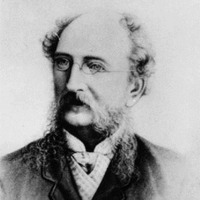My Chinee Cook
They who say the bush is dull are not so very far astray,
For this eucalyptic cloisterdom is anything but gay;
But its uneventful dulness I contentedly could brook,
If I only could get back my lost, lamented Chinee cook.
We had tried them without number—cooks, to wit—my wife and I;
One a week, then three a fortnight, as my wife can testify;
But at last we got the right one; I may say ’twas by a fluke,
For he dropped in miscellaneous-like, that handy Chinee cook,
He found the kitchen empty, laid his swag down, and commenced;
My wife, surprised, found nothing to say anything against;
But she asked him for how much a year the work he undertook—
“Me workee for me ration,” said that noble Chinee cook.
Then right off from next to nothing such a dinner he prepared,
That the Governor I’m certain less luxuriously fared;
And he waited, too, in spotless white, with such respectful look,
And bowed his head when grace was said, that pious Chinee cook.
He did the work of man and maid—made beds and swept out rooms;
Nor cooled he in his zeal, as is the manner of new brooms:
Oh, he shed celestial brightness on the most sequestered nook,
For his mop and pail were everywhere—my cleanly Chinee cook.
We got fat upon his cooking; we were happy in those days,
For he tickled up our palates in a thousand pleasant ways.
Oh his dinners! Oh his dinners! they were fit for any duke!
Oh delectable Mongolian! Oh celestial Chinee cook!
There was nothing in creation that he didn’t put to use,
And the less he got to cook with, all the more he could produce,
All nature was his kitchen range, likewise his cook’ry book—
Neither Soyer nor Meg Dod could teach that knowing Chinee cook.
And day by day upon my wife and me the mystery grew,
How his virtues were so many and his earnings were so few;
And we laid our heads together to find out by hook or crook,
The secret of the cheapness of that priceless Chinee cook.
And still the sense of mystery grew on us day by day,
Till it came to be a trouble, and we wished him well away;
But we could not find a fault in one so far above rebuke—
Ah, we didn’t know the value of that valuable cook.
But one day when I was out he brought my wife a lot of things,
Turquoise earrings, opal bracelets, ruby brooches, diamond rings,
And he ran their various prices o’er as glibly as a book,
And dirt cheap, too, were the jewels of that jewel of a cook.
I returned, and just in time to stop the purchase of the lot,
And to ask him where on earth those costly jewels he had got,
And when I looked him in the face, good gracious how he shook!
And he says, says he, “Me bought him”—did that trembling Chinee cook.
And I a justice of the peace! O Fortune! how unkind!
For a certain Sydney robbery came rushing to my mind
“You bought them! Ah, I fear me, John, you paid them with a hook!
I am bound to apprehend you, oh unhappy Chinee cook!”
So the mystery was solved at length; the secret now we saw;
John had used us as a refuge from the clutches of the law;
And, now, alas, too late would I his frailty overlook!
He is gone, and I am left without my skilful Chinee cook.
Oh, could I taste again of those delicious luscious things,
I could pardon him the robbery of other people’s rings;
I exaggerated principle, my duty I mistook,
When I handed over to the law my peerless Chinee cook.
What would I give just now for one of his superb ragouts,
His entrements, his entrées, his incomparable stews?
Oh, art and taste and piquancy my happy board forsook,
When I came the J.P. over my lamented Chinee cook.
Take away the hated letters. ’Twas my “justice” robbed my “peace”;
Take my name from the commission, and my matchless cook release.
But I fear my Johnny’s dead, for I am haunted by a spook,
With oblique eyes and a pigtail, like my lost, my Chinee cook.

